Materials Science and Engineering is the invisible force behind every major innovation, from smartphones to spacecraft. Understanding its principles is crucial for future engineers, and getting expert help can unlock success.

Think about the smartphone in your pocket. It’s a marvel of technology, isn’t it? A sleek pane of glass, a lightweight metal frame, a battery that lasts all day. But have you ever stopped to wonder what it’s made of? Not just the brands or the components, but the actual, fundamental “stuff.”
That glass is incredibly strong yet transparent. The metal case is light but durable. The battery stores a huge amount of energy in a tiny space. None of this happened by accident. It’s the result of decades of work in a field you might not have even heard of: Materials Science and Engineering (MSE).
MSE is the hidden science that shapes our world. It’s the art and science of creating new materials and improving existing ones to make everything faster, stronger, smaller, and more sustainable. It’s a field that combines physics, chemistry, and engineering to solve some of humanity’s biggest challenges.
What Exactly Is Materials Science and Engineering?
At its core, MSE is about understanding the relationship between a material’s internal structure and its overall properties. Imagine being a chef. You know that the ingredients you use (flour, sugar, eggs) and how you process them (mix, knead, bake) will determine the final properties of your cake (its taste, texture, and fluffiness). Materials scientists do the same thing, but with atoms and molecules.
Let’s translate this culinary analogy into actual engineering terms. The visual below maps the journey from kitchen ingredients to atomic engineering.
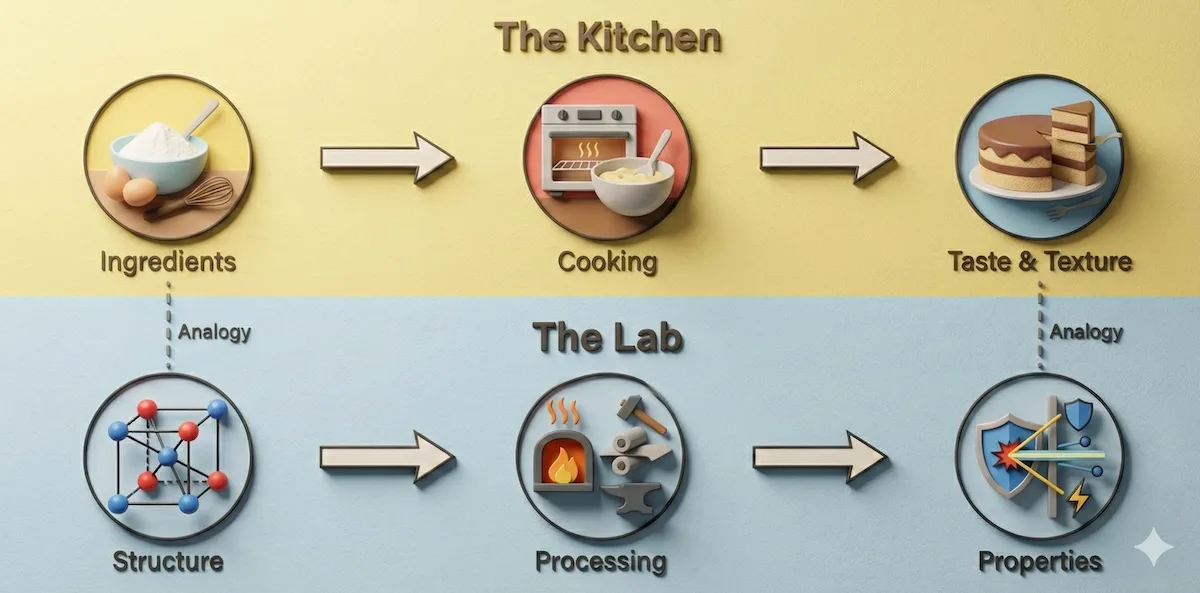
Just as ingredients and cooking determine a cake’s taste, atomic structure and processing determine a material’s properties.
Just as a chef tweaks oven temperature to change a cake’s texture, a materials engineer tweaks heat treatment to change a metal’s strength.
The Four Pillars of MSE
This relationship is often described as the four pillars of Materials Science and Engineering:
- Structure: How a material’s atoms and crystals are arranged. Is it a perfectly ordered lattice or a jumbled mess?
- Properties: The characteristics a material exhibits. Is it strong? Does it conduct electricity? Is it resistant to heat?
- Processing: How a material is made. Was it melted and cooled quickly? Was it stretched or compressed?
- Performance: How the material behaves in a specific application. Does it prevent a hip implant from failing? Does it make a car lighter and more fuel-efficient?
Changing just one of these pillars can dramatically alter the others. This intricate dance is what makes the field so challenging and so fascinating.
To understand how engineers make sense of this chaos, they use a fundamental framework. The following diagram illustrates the ‘Materials Science Tetrahedron,’ showing how every aspect of a material is connected.
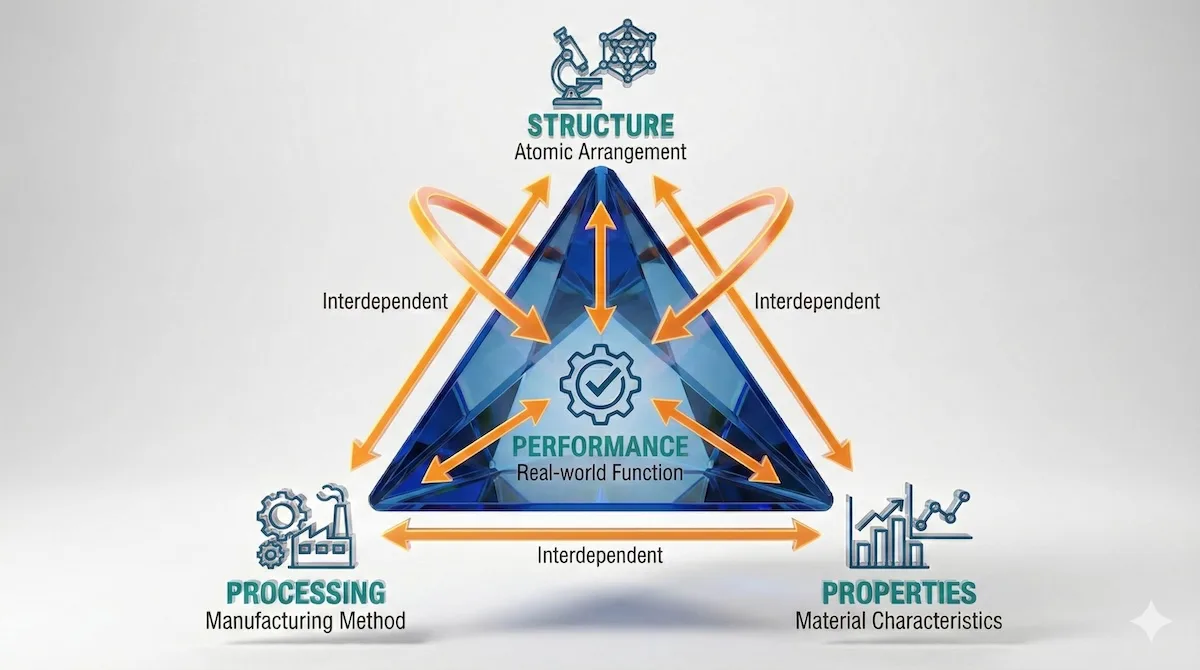
The Materials Science Tetrahedron illustrates how changes in processing or structure directly impact properties and final performance.
As you can see, you cannot change the processing method without affecting the structure, and consequently, the final performance.
The Main Classes of Materials
Materials engineers work with a vast palette of materials, generally grouped into a few key classes:
- Metals: Strong, ductile, and excellent conductors of heat and electricity. Think steel beams, aluminum foil, and copper wires.
- Ceramics: Hard, brittle, and fantastic insulators. They can withstand incredibly high temperatures. Examples include pottery, glass, and the heat shields on a space shuttle.
- Polymers: What we commonly call plastics. They are lightweight, flexible, and can be easily molded into complex shapes. Your water bottle, car dashboard, and nylon jacket are all polymers.
- Composites: These are combinations of two or more materials, designed to have the best properties of each. Carbon fiber reinforced polymer, used in race cars and aircraft, is a classic example—it’s as strong as steel but a fraction of the weight.
Today, scientists are also pioneering exciting new areas like biomaterials for medicine, semiconductors for electronics, and nanomaterials, which have unique properties at the atomic scale.
It can be difficult to keep track of the specific strengths and weaknesses of each group. This comparison table breaks down the key differences between metals, ceramics, polymers, and composites at a glance.
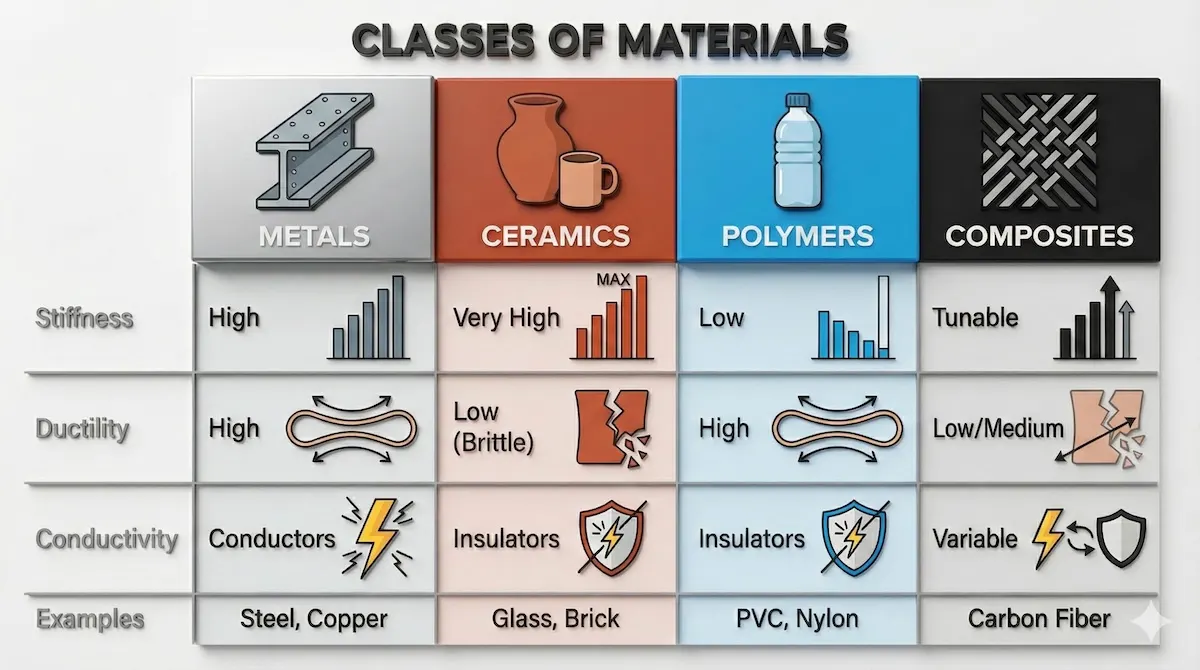
A quick comparison of the four main material classes: Metals, Ceramics, Polymers, and Composites.
While this table provides a general rule of thumb, remember that modern engineering is constantly breaking these boundaries with new hybrid materials.
Why MSE Is a Game-Changer for Our Future
If you want to solve the world’s biggest problems, you need the right materials. From climate change to healthcare, MSE is at the forefront of innovation.
Revolutionizing Medicine
Let’s talk about Sarah’s grandmother. Years ago, a hip replacement was a major operation with a long, painful recovery. The materials used were strong, but the body often treated them as foreign invaders. Today, thanks to advances in biomaterials, implants are made from titanium alloys with special coatings that encourage bone to grow into them, making them a seamless part of the body. The global market for these medical biomaterials is projected to reach over $250 billion by 2027, a testament to their life-changing impact (Source: Grand View Research). This is the work of a materials engineer.
Powering the Green Revolution
The transition to renewable energy is, fundamentally, a materials challenge. We need solar panels that are more efficient at converting sunlight into electricity. We need wind turbine blades that are longer, lighter, and more durable. We need batteries that can store more energy for electric vehicles and power grids. Each of these requires a deep understanding of materials. The effective Materials Science and Engineering teaching in universities today is what will empower the next generation of innovators to solve these very problems.
The Next Age of Electronics
For decades, the electronics industry has been guided by Moore’s Law, which predicted that the number of transistors on a chip would double about every two years. We are now pushing the physical limits of silicon, the primary material used. Materials scientists are racing to find what’s next, exploring wonder materials like graphene and new semiconductor composites to create faster, more powerful computers. Your foldable phone is a direct result of a Materials Science and Engineering teacher and their students exploring the frontiers of flexible polymers and electronics.
These aren’t just theoretical improvements; they reshape entire industries. Here are three critical sectors where materials science is currently driving the biggest revolutions.
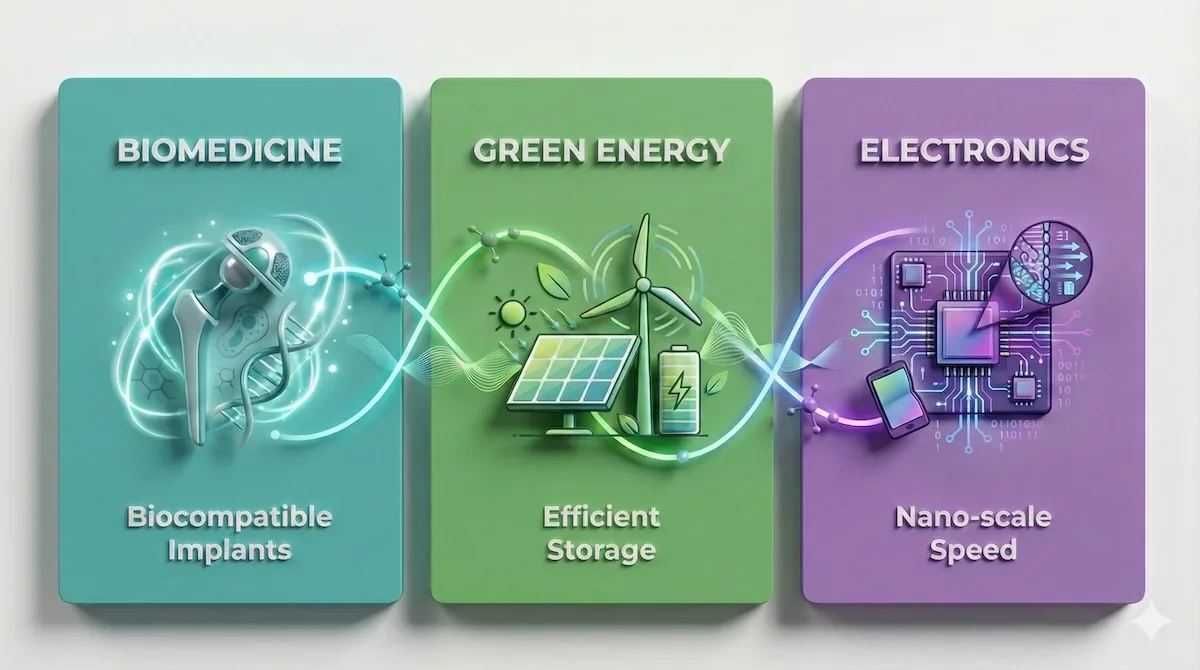
From saving lives to saving the planet, Materials Science drives innovation in medicine, energy, and computing.
Whether it is extending human life or powering our cities, the impact of these materials is visible everywhere around us.
A Day in the Life: What Do Materials Engineers Do?
So what does a career in MSE actually look like? It’s incredibly diverse. One day, an engineer might be in a lab, using a powerful electron microscope to analyze why a jet engine turbine blade failed. The next, they could be on a factory floor, developing a new process to make recyclable plastics. The work is part detective, part inventor, and part problem-solver.
Consider James, a recent MSE graduate. He works for an automotive company. His current project is to reduce the weight of a new electric vehicle to increase its range. He spends his mornings researching new aluminum alloys and polymer composites. His afternoons are spent in the lab, running tests on their strength, durability, and crash resistance. He remembers his college days, when grasping these complex topics often required extra support. He frequently sought out Materials Science and Engineering homework help to truly understand the theoretical underpinnings of his work today.
Navigating the Challenges of Studying MSE
As you can imagine, a field that blends so much deep science and practical engineering can be demanding. Students often find certain topics, like thermodynamics, crystallography, and phase diagrams, to be particularly abstract and challenging. The jump from theory in a textbook to a real-world application isn’t always obvious.
Finding the Right Support System
This is where getting the right help becomes a game-changer. Just like an athlete has a coach, many top students in technical fields rely on academic support to excel. When you’re staring at a complex problem late at night, a little guidance can make all the difference.
Many students find that a dedicated Materials Science and Engineering tutor can illuminate difficult concepts in a way that clicks. These tutors are often experts who have navigated the same curriculum and can provide one-on-one attention that’s hard to get in a crowded lecture hall.
In today’s connected world, this support is more accessible than ever. The convenience of finding a Materials Science and Engineering tutor online means you can get help from a top expert, no matter where you live. This flexibility is perfect for busy college schedules.
Sometimes, it’s not just about one topic, but about a specific project or assignment. When a tough deadline is approaching, services that provide Materials Science and Engineering assignment help can be invaluable. A good service won’t just give you the answers; they will guide you through the problem-solving process, making sure you actually learn the material. This kind of targeted Materials Science and Engineering hw help can turn a stressful experience into a powerful learning opportunity.
Ultimately, if you are serious about mastering this subject, you might decide to hire a Materials Science and Engineering tutor for regular sessions. This kind of consistent, personalized Materials Science and Engineering tutoring builds a strong foundation, boosts confidence, and can significantly improve grades.
Career Paths and Opportunities in MSE
The hard work pays off. A degree in Materials Science and Engineering opens doors to a vast array of high-paying, impactful careers. Every industry that makes a physical product needs materials experts.
Graduates work in fields as diverse as:
- Aerospace: Designing lightweight alloys and composites for airplanes and spacecraft.
- Biomedical: Creating artificial organs, medical devices, and drug-delivery systems.
- Electronics: Developing the next generation of semiconductors, displays, and sensors.
- Energy: Working on materials for batteries, solar cells, and nuclear reactors.
- Manufacturing: Improving production processes and ensuring quality control for everything from cars to consumer goods.
The career outlook is strong. The U.S. Bureau of Labor Statistics (BLS) projects steady employment growth for materials engineers, with a median annual salary well over $98,000 as of May 2023. It’s a field that offers not just financial stability, but the chance to be at the center of innovation.
But where exactly do these engineers work? The chart below highlights the diverse industries hiring materials experts and the competitive salaries they offer.
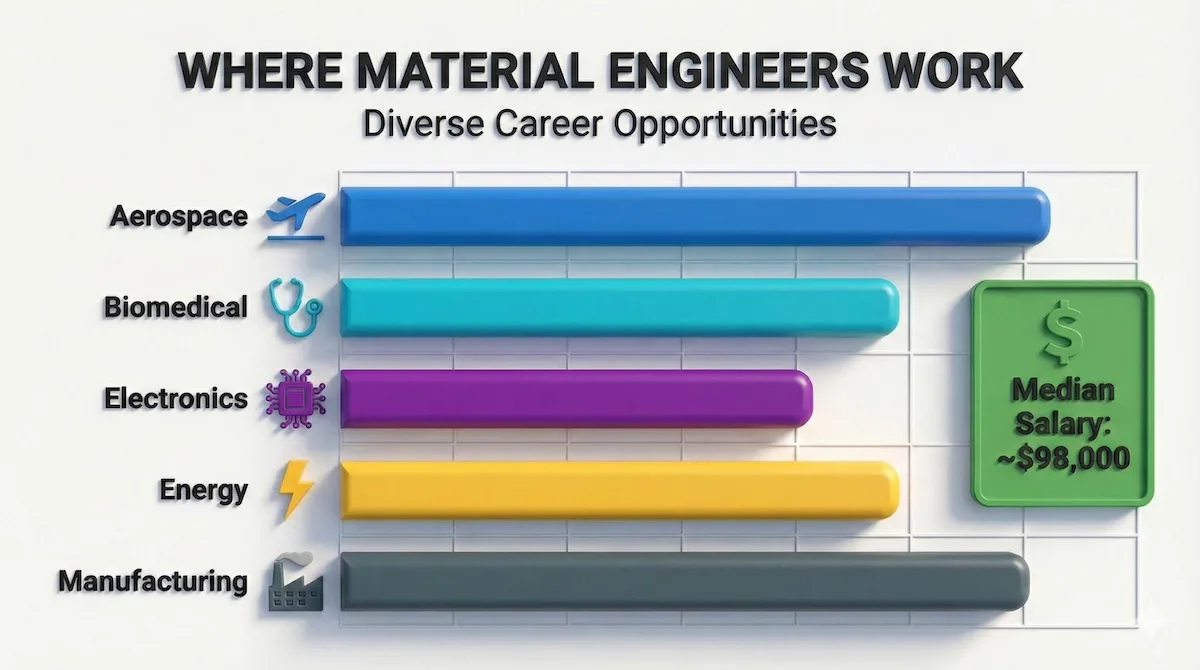
A degree in MSE opens doors to high-paying roles in diverse sectors like Aerospace, Energy, and Biotech.
This versatility means you aren’t tied to a single industry; your skills are transferable across aerospace, energy, and biomedical fields.
The Building Blocks of Tomorrow
From the Stone Age to the Silicon Age, the advancement of human civilization has always been defined by our mastery of materials. The students learning about this subject today are the architects of our future. They will build the technologies that will define the 21st century.
It’s a challenging path, but an incredibly rewarding one. And it’s important to remember that seeking help is a sign of strength. Whether you need a one-off session with an expert for Materials Science and Engineering tutoring or ongoing support from a Materials Science and Engineering tutor online, getting the right guidance is a smart investment in a future career that will literally build the world of tomorrow.
Frequently Asked Questions (FAQs)
Q1 What is Materials Science and Engineering?
It is the interdisciplinary field that studies the properties of materials and how to apply them to engineering and science.
Q2 Is MSE a difficult major?
It can be challenging as it combines deep concepts from physics, chemistry, and engineering, but it is also very rewarding.
Q3 What kind of jobs can I get with an MSE degree?
Graduates work in almost every industry, including aerospace, biomedical, electronics, and energy, in roles like research, design, and manufacturing.
Q4 Why is finding a good Materials Science and Engineering tutor important?
A good tutor can provide personalized explanations for complex topics and help you connect theory to real-world applications.
Q5 Can I get Materials Science and Engineering tutoring online?
Yes, online tutoring offers a flexible and convenient way to connect with expert tutors from anywhere in the world.
Q6 What is the main goal of this field?
The main goal is to understand how a material’s structure affects its properties to create new materials and improve existing ones for specific applications.
Related Subjects
Physical metallurgy
Polymer Science and Engineering
Spectroscopy
Tribology
******************************
This article provides general educational guidance only. It is NOT official exam policy, professional academic advice, or guaranteed results. Always verify information with your school, official exam boards (College Board, Cambridge, IB), or qualified professionals before making decisions. Read Full Policies & Disclaimer , Contact Us To Report An Error
